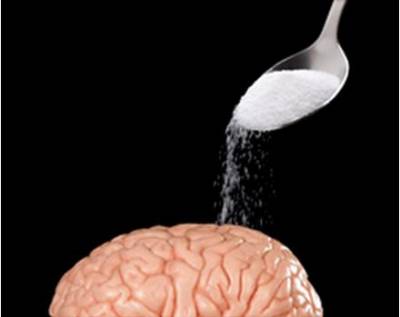DrCarney.com Blog
Sugar Linked to Diminished Mental Capacity
What do holidays, birthdays, and family celebrations all have in common? If you answered food, you are correct! In today's culture, celebrating a special occasion without the typical American fare of gooey, weight-promoting desserts would almost be considered un-American.
We all know that sugar certainly isn't a health-promoting food, but why is sugar so hard to avoid? Why does the chocolate cream pie seem to be calling our names? This article written by Dr. Joel Fuhrman briefly explains the physiological reasons why it's so hard to avoid these rich foods, and the harmful effects they can produce.
Dr. Fuhrman points out that "glucose is the primary fuel for the human brain," but when the brain "is exposed to the excessive added sugars of the standard American diet," complications such as blood vessel damage can occur. Diabetics in particular suffer many consequences associated with added sugars in their diet such as vascular retinopathy of the eyes. Hyperglycemia in both diabetics and non-diabetics causes blood vessel damage throughout the body, including the brain. Additionally, Dr. Fuhrman says, "There is evidence that this damage contributes to a progressive decline in brain function." Diabetics have been found to have "deficits in learning, memory, motor speed, and other cognitive functions." Diminished mental capacity, brain shrinkage, lower scores on tests of cognitive function, and Alzheimer's disease are also associated with elevated blood sugar levels.
Sugar's injurious effects are not limited to long term damage, but can also be seen during a single instance of hyperglycemia. Dr. Fuhrman mentions that our "brain's ability to process emotion is compromised" along with "increased feelings of sadness and anxiety, slowed cognitive function and deficits in attention and memory."
Furthermore, studies also show that sugar produces "drug-like effects in the reward system of the brain" which leads to compulsive eating and food addictions.
As you can see, consuming refined sugars has many disadvantages. These can be avoided, however, by replacing added sugars with sweet fresh fruits as Dr. Fuhrman suggests.
Read the entire article, "What Does Sugar Do to the Brain?" by Joel Fuhrman, MD here.
For more infomation, see:
(2) Losing Weight Without Losing Your Mind
(3) Breaking the Food Seduction
(4) Toxic Hunger Creates Food Addictions
Joel Fuhrman MD Links
Scroll Down Page to Leave Comments

What Have You Got to Lose?
Fight the Obesity Epidemic! We provide Starch-Smart Support through our Helpful Sharing Community, Discussion Forums, and Blogging Platform.
When you subscribe to the blog, we will send you an e-mail when there are new updates on the site so you wouldn't miss them.




